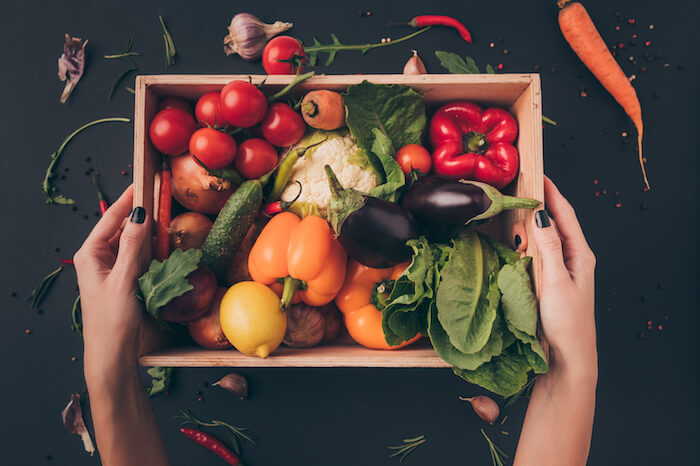Intermittent Fasting Bigger Meals and Avoiding Excessive Bloating
In this article, I'm going to explain everything you need to know about intermittent fasting (IF) and how to eat bigger meals without feeling bloated. Many people who first start intermittent fasting feel very bloated. This problem is extremely common. Instead of smaller meals spread throughout the day, you have one or two large meals. More food can mean painful bloating.
I'm going to share some of the best ways to reduce stomach bloating without reducing your calorie intake. Before we jump in, let me explain what intermittent fasting is and how it benefits the body.

What is intermittent fasting?
Intermittent fasting is a pattern of eating that cycles between periods of eating and periods of fasting. While it can be done with any diet, I always recommend doing intermittent fasting with a keto diet.
If you're not already familiar with keto, it's a low-carbohydrate diet that helps you with weight loss, normalizing your Fat Storing Hormone levels, and improving your overall health. Unlike most diets, the ketogenic diet is not a low-calorie diet. By going on a low carb and high-fat diet, you allow your body to go into a metabolic state called ketosis. Ketosis is when your body turns fat into ketones to use as fuel instead of using carbs and sugar as fuel. This is fantastic for reducing unwanted belly fat.
When you are first developing an intermittent fasting routine, you will create an eating window. The only time you allow yourself to consume any food is during the eating window.
During the fasting period, you can only have things like water, black coffee, unsweet tea, and other beverages with zero calories. Any amount of calories can activate your digestive system and break your fast. It's essential to drink plenty of water, which many people forget to do while fasting. Not only is it vital to stay hydrated, but drinking water can help reduce any cravings you have during fasting.
Here is an example of intermittent fasting:
- Fasting period: 8:00 pm to 12:00 pm
- Eating period: 12:00 pm to 8:00 pm
This gives you a 16-hour fasting period and an 8-hour eating period. The 16/8 method is excellent for those that are new to intermittent fasting. In this method, you skip breakfast, have your first meal around 12:00 pm, and have your last meal before 8:00 pm. After 8:00 pm, you don't have another meal until the next day.
There are more extreme intermittent methods, which may look like this:
- Fasting period: 4:00 pm to 3:00 pm
- Eating period: 3:00 pm to 4:00 pm
This is a 23/1 fast—which I do not recommend unless you're very experienced. Until you have made intermittent fasting a habit, jumping into an extreme fasting routine like this is unhealthy. Much like exercise, you have to ease into fasting so that you don't cause harm to your body. I recommend starting with the 16/8 method. Work your way to 17/7, then to 18/6, and so on.
Health benefits of intermittent fasting
People have been fasting for thousands and thousands of years. When there were times of food scarcity, there wasn't any other option but to fast. But necessity isn't the only reason for fasting. Many religious practices and philosophies encourage fasting for both health and ritual purposes.
Fasting isn't unnatural or unhealthy—as long as it's done the right way. There are numerous benefits to doing intermittent fasting.
When you do intermittent fasting, you allow your body to have time recuperate. Though consuming food doesn't seem like a lot of work, your body takes care of a whole range of complex processes while you go about your day. This includes producing stomach acid, digesting food, absorbing food, creating hormones, regulating blood sugar levels, and much more.
Your digestive system can become fatigued because it needs time to cool down between meals. If you are interested in Dr. Berg's intermittent fasting and meal plan you can learn more here. If you eat breakfast right after you wake up and dinner just before bed each day, your stomach spends very little (if any) time empty.
If your stomach isn't completely empty, then your digestive system is still working to break down food. It is unhealthy not to have a break from digestion—just as your muscles need time to rest before you begin exercising again.
Intermittent fasting results in better digestion, more effortless weight loss, and better control over your hormones (including Fat Storing Hormone, which regulates your blood sugar levels).
Longer Fasting = Larger Meals
If you don't eat larger meals while intermittent fasting, you may experience malnutrition symptoms like low energy levels and fatigue. Your body still needs an adequate amount of nutrients and fuel to continue working correctly.
Keto is not a low-calorie diet. You need an adequate number of calories from fat and protein. Intermittent fasting should not affect how many calories you have; it should only affect when you consume calories. If you feel a significant increase in hunger while doing intermittent fasting, you may not be getting enough calories.
The problem is that you only have so much capacity to digest food—especially if you're not used to it or if your metabolism is slow. What ends up happening is you stuff yourself with large meals, which causes you to feel bloated. We want to avoid this.
People who are new to IF often have a slight fear of not eating, so they try to stuff themselves with as much food as possible. If you fit 2,000 calories into one meal, you'll likely feel very bloated. Furthermore, it adds a lot of stress to the digestive system—which we don't want.
But I have some tips for avoiding this problem, all while getting the nutrients you need.

How to Avoid Bloating
1. Don't Overeat
The first thing to remember to do when intermittent fasting is that you want to have the optimal meal—one that makes you full, but not stuffed. Stuffing yourself is tempting until the bloating happens soon after. Eating too little will also cause problems because your body will crave more nutrients during your fasting period. Try finding that sweet spot between full but not stuffed.
2. Spread Out Your Foods
Another thing that helps a lot is to separate your foods. Instead of having vegetables, protein, and fat all at once, have them separately. You can space these meals apart to give your digestive system time to digest each type of food first. What ends up happening if you eat too much of a wide variety of food at once is that you overwhelm your digestive system. Your digestive system has to produce extra enzymes to break down a large number of different foods.
Instead of having all of your food within a 30-minute period, have it over a few hours. Start with having your vegetables and give your stomach time to rest. Then, have your protein and fat. If you fast ends at 3:00 pm, you can have your vegetables, and then wait to have your protein and fat until just before 6:00 pm. This will still give you 21 hours of fasting
Of course, many people don't want to do a 21/3 fast. That's perfectly fine. If you're brand new to keto and fasting, you don't have to start with a fasting routine like this. This method works great with shorter fasts as well. As another example, you can have protein and fat at 1:00 pm, your vegetables at 3:00 pm, and protein and fat again at 5:00 or 6:00 pm.
3. Improve Your Stomach Acid
Many people do not have the stomach acid to digest properly. You want your stomach acid to have a PH of between 1 and 3. This is extremely acidic. However, as you get older, you begin to lose that acid. This is when you experience symptoms like GERD, acid reflux, indigestion, bloating, and gas. Though it seems counterintuitive, the more acidic your stomach is, the less acid reflux you will experience.
What I recommend to fix this problem is to have more apple cider vinegar. Apple cider vinegar is very acidic, and it helps bring your stomach PH level back to between 1 and 3. If you don't like the taste of apple cider vinegar, I recommend trying digestion capsules with an apple cider vinegar concentrate.
4. Avoid Foods You're Sensitive To
When you consume a particular food—especially a vegetable like broccoli or kale—you might not be able to digest it, which will cause you to bloat. Try removing and adding different vegetables to your diet and see if anything changes. Cabbage, broccoli, and kale are common ones you might want to try isolating—particularly if you aren't used to having these vegetables.
5. Watch Out for Food Allergies
You may find that you have an allergy to different foods. Many people are allergic to things in cheese like lactose or casein. Again, isolate these foods to see if you may have a food allergy. Thankfully, since you aren't having grains, sugars, and processed foods, you shouldn't have a major problem with allergies on keto.
6. Don't Eat Too Much Fat
The last thing you should keep in mind is that eating too much fat can cause bloating. While you do need plenty of fat on keto, too much will lead to digestion problems and gallbladder strain. Overeating fat can cause pain from your right rib cage all the way up to your shoulder, neck, and head because of the phrenic nerve. With delicious recipes for keto bombs and other full-fat snacks, it can be very easy to go overboard, so watch out for this. I did a whole other video just on this topic—take a look at it here.
I hope that these tips help. Give them a try and let me know how they work for you.
Up Next:
- 5 Tricks to Make Intermittent Fasting Work Faster
- Benefits of One Meal A Day IF
- Does IF Cause Muscle Loss?
Disclaimer: Our educational content is not meant or intended for medical advice or treatment.
Editor’s Note: This post has been updated for quality and relevancy.
Previous blog
Is Store bought Lemon Juice Rich in Vitamin C Not Quite
Popular
08/31/2023
11.6K views
08/31/2023
14.6K views
08/31/2023
145.3K views
03/18/2024
11/21/2022




